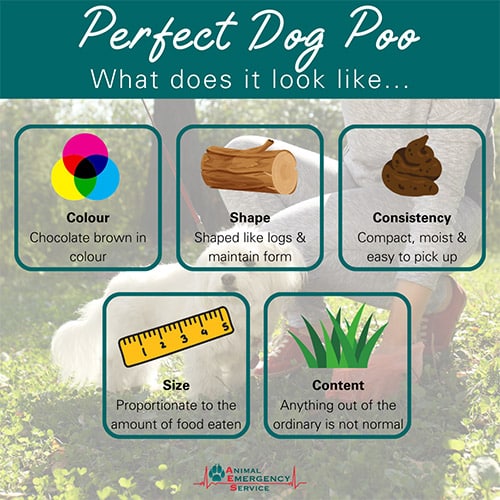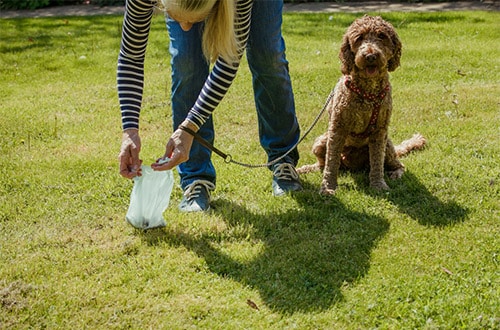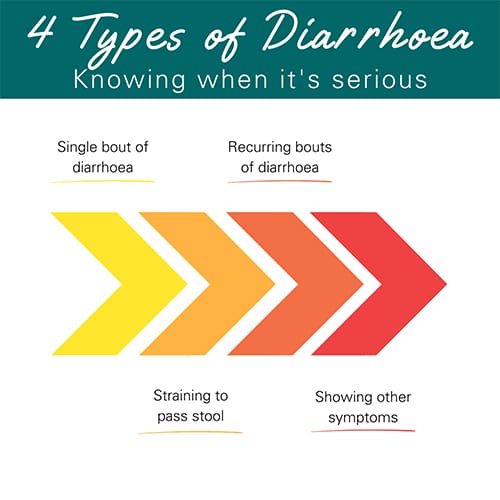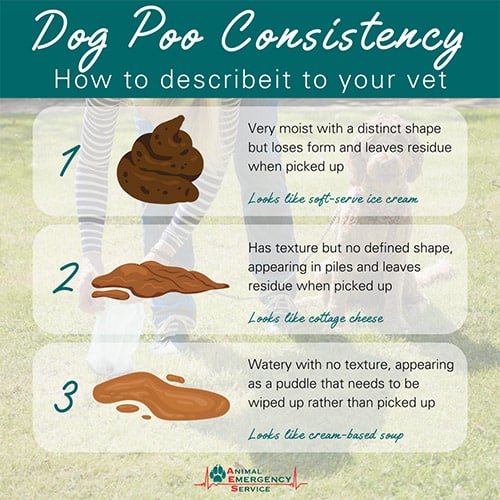If your dog has diarrhoea, you’re not alone. Most dogs will experience diarrhoea at least once in their lives. While it is a common occurrence amongst our canine companions, it does vary in frequency, duration, and intensity from dog to dog. It can also be a sign of a more serious underlying condition. but how do you know when it’s serious? And when, or should, you go to the vet? We’ve put a guide together to help answer all your questions, including what causes diarrhoea in dogs, the signs it’s serious and when to go to the vet, as well as what is involved with treatment.
What is diarrhoea
Diarrhoea is the passing of soft, unformed or loose, liquid-like stools. It usually occurs in large amounts, and/or more frequently than usual. It can occur suddenly and lasts as long as a day or two, to up to a few weeks or months.
Diarrhoea isn’t a disease, rather, it is a symptoms of many different diseases. Luckily, many cases of diarrhoea in dogs aren’t serious and will resolve by themselves or with simple treatments.
Mild bouts of diarrhoea are often caused by intestinal distress. This may be because your pooch has eaten something that doesn’t agree with them, such as a scrap from your plate, or simply from switching to a new brand of food. However, sometimes diarrhoea can point towards a more serious health issue your dog is suffering from. This is usually the case if it lass longer than a few days.
The perfect dog poop!
How do you know if your dog has diarrhoea? And how do you know if their poop is normal?
Every dog is unique, and what is one dog’s normal, healthy poop might be slightly different to another dog’s poop. However, there are five facets to the ‘perfect poop’ to look for:
- Colour – should look chocolate brown (if your dog is eating food with added colours in it, the colours may be present)
- Shape – should be shaped like a log and maintain its form
- Consistency – should be compact, moist, easy to pick up but feel like Play-Doh when pressed
- Size – should be proportionate to the amount of food your pooch eats and fibre intake
- Content – anything out of the ordinary in their poop, including signs of mucus, blood excessive grass is not normal
Diarrhoea symptoms
It’s not just the look, there are also other signs and symptoms of diarrhoea. These can include:
- Strong-smelling or excessive flatulence
- Changes in the volume of stool
- Changes in appetite
- Stomach sounds that are louder than usual
- Increased water intake due to increased bowel movements
- A hurried urge to release their bowels
- Vomiting
Ongoing diarrhoea can also lead to lethargy, dehydration, reduced appetite, fever, weight loss and vomiting.
What causes diarrhoea in dogs
There are many causes of diarrhoea in dogs. But the most common causes of a bout of sudden diarrhoea (also known as acute diarrhoea) in an otherwise healthy dog are:
- Dietary indiscretion, such as scavenging or eating food outside their diet like food scraps
- A sudden change in diet, for example switching their food without a transitioning period
- Reaction from medications
- Stress or anxiety
- Ingesting poisons or toxins
- Ingesting foreign objects, like sticks or toys
- Mild bacterial infections
- Parasitic infections
More severe cases of diarrhoea, such as frequent bouts or prolonged symptoms (also known as chronic diarrhoea), can be caused by:
- Dietary allergies or intolerances
- Allergic reactions
- Stress
- Viral infections, such as parvovirus
- Some types of parasites, such as hookworms
- Bacterial infections like Salmonella or E. coli
- Pancreatic disease
- Inflammatory bowel disease
- Irritable bowel syndrome
- Some types of cancer
- Liver or kidney disease
Can dogs be predisposed to having diarrhoea?
All dogs are susceptible to developing diarrhoea. However, puppies may be predisposed to diarrhoea due to the presence of parasites, where they are in their vaccination schedule, stress-related changes, and even changes in their diet as they become weaned. As well as older dogs and dogs with pre-existing health issues also have a higher likelihood of suffering from diarrhoea.
Pooches living in stressful environments or those who have moved into a new home are also more likely to develop the condition.
Certain breeds can be predisposed to experiencing diarrhoea. Greyhounds are very sensitive to diet changes and inflammatory bowel disease, both of which can cause loose stools. Labradors and Golden Retrievers are known for their love of eating anything and everything, which can cause a foreign body to become stuck in their gastrointestinal tract! There are other medical conditions common in certain breeds that ca cause diarrhoea. These include Miniature Schnauzers, Yorkshire Terriers, and Shetland Sheepdogs are predisposed to pancreatitis. German Shepherds and Boxers are also predisposed to a few medical problems which can cause diarrhoea.
When is diarrhoea serious
With so many potential causes of diarrhoea, how do you know whether or not your dog needs to visit the vet? If you dog is very young, very old, or has pre-existing health conditions they can become extremely unwell even form a mild case of diarrhoea. In these cases it’s best to contact your veterinarian for advice.
If your pooch is otherwise healthy, there are a few situations where a visit to the vet is recommended. Generally, diarrhoea can fall into one of four types, each increasing in severity: a single bout of diarrhoea, straining to pass a stool, recurring bouts of diarrhoea, and showing other symptoms on top of diarrhoea.
Single bout of diarrhoea
If your dog only has a single bout of diarrhoea and is other wise acting normal, there is likely no need for concern. If this is the case, continue to track your pooch’s bowel movements to see if they start to resolve themselves. However, if your pooch has more than two bouts of diarrhoea, this can indicate a health issue and is best to visit your vet.
Straining to pass stool
If you find your dog straining to pass a stool and only passing a small amount of watery diarrhoea, this is cause for concern. As it’s possible that your pup is experiencing a blockage from ingesting a foreign object, such as a toy. In these cases visit your vet or closest emergency vet straight away.
Recurring bouts of diarrhoea
If your pup is experiencing recurring bouts of diarrhoea over a short period of time or it persists form more than a day, this may be a sign of a serious health conditions. This is particularly the case if your pup is very young, very old, or has a compromised immune system. For example, diarrhoea is a symptom of parvovirus, an extremely contagious and life-threatening disease.
Should your dog be experiencing recurring diarrhoea, visit your vet straight away.
Showing other symptoms as well as diarrhoea
If your dog has diarrhoea and is experiencing any of the below symptoms visit your local vet or closest emergency vet as soon as possible. These signs may point to them having a serious underlying condition, and early detection and treatment is key.
- Lack of appetite
- Not drinking or signs of dehydration, such as sunken dry-looking eyes, sticky and dry gums
- Drooling
- Lethargy
- Weakness
- In pain or showing discomfort
- Vomiting
- Bloody diarrhoea
How to stop diarrhoea in dogs
If you are ever concerned about your dog’s health we always recommend seeing your local vet or closest animal emergency hospital.
If your dog is having recurring bouts of diarrhoea, straining , showing other symptoms, or has existing medical conditions, see your vet immediately. But if your dog has only had one or two episodes of diarrhoea you may want to follow the below steps at home first:
- Make sure they have access to plenty of fresh water to avoid dehydration
- Withhold their food for 12-24 hours to give them time to recover through fasting
- A bland diet for 24-48 hours of plain white rice with some boiled chicken breast given in small amounts every few hours may help to resolve the issue
- Once their stool starts to return to a normal consistency, gradually start to reintroduce their regular food over two to three days mixing with the bland diet, increasing the proportion of normal food with each meal
Should your dog’s diarrhoea continue longer than 24 hours or their condition worsens at any time, visit your local vet or emergency veterinarian immediately.
What will a vet do to treat my dog’s diarrhoea
When you arrive, your veterinarian will perform a physical exam to assist in developing a treatment plan. Your veterinarian will also ask questions about your dog’s symptoms and their medical history.
What to tell the vet
If you can, try to take note of the following as this information is also very helpful in diagnosing you pooch and creating a treatment plan:
- How long has the diarrhoea been occurring and how frequently
- The colour of their stool and whether any blood is present
- If your dog is no longer eating and drinking normally
- If your dog has vomited
- Any other medical issues
- Sample of your dog’s diarrhoea, if this isn’t possible describe the consistency to your vet
Your pet’s treatment
Diagnosing the cause of diarrhoea can be as simple as performing a physical exam and faecal test to rule out parasites.
In some cases, particularly with severe or ongoing diarrhoea, your veterinarian may need to perform further tests to rule out the more concerning causes. These can include:
- Blood tests to rule out concerns with organ functions
- X-rays or ultrasounds to rule out foreign objects, obstructions, abnormal fluid, and cancer
- Endoscopy to view the stomach
- Biochemistry panel to evaluate the protein, electrolytes, kidney function and liver enzymes
- Urinalysis to evaluate kidney function
- Testing for specific viruses and bacteria, for example parvovirus faecal test
- Biopsies of the intestinal tract
- Specific faecal lab tests to determine bacteria causing the diarrhoea
Once a diagnosis has been reached, treatment can begin. Treatment will depend on the severity of your dog’s diarrhoea. In mild cases treatment may be as simple as:
- Dewormers, just in case parasites are present
- A low-fat, high-fibre bland diet
- A veterinary recommended probiotic
- Anti-diarrhoeal agents
Should your pup not improve within two to four days, or is suffering from a severe bout of chronic diarrhoea, treatment can include:
- Intravenous fluid therapy to treat dehydration
- Anti-nausea medication
- Medication to protect the stomach and intestines
- Drugs to control the movement of the intestines
- Drugs to relieve inflammation in the intestinal tract
- Pain relief medication
- Antibiotics to help normalise the bacteria within the gastrointestinal tract
- In extreme cases hospitalisation may be needed
- Feeding tube to provide nutrition, especially in diarrhoea caused by parvovirus
In most cases dogs with diarrhoea will make a full recover, while those with chronic diarrhoea may require dietary management or medication to keep their condition under control.
How to prevent diarrhoea in dogs
There are a few measures you can take to help reduce the risk of your dog experiencing a bout of diarrhoea. These include:
- Avoid suddenly changing your dog’s diet
- Introduce any new food gradually by slowly mixing it in with their regular diet
- Avoid feeding table scraps to your pooch or allowing them to scavenge
- Keep your dog up-to-date with worming treatments and vaccinations
- Ensure any toxic substances are looked away from furry paws
If your dog is suffering from diarrhoea, visit your local vet or closest animal emergency hospital.




